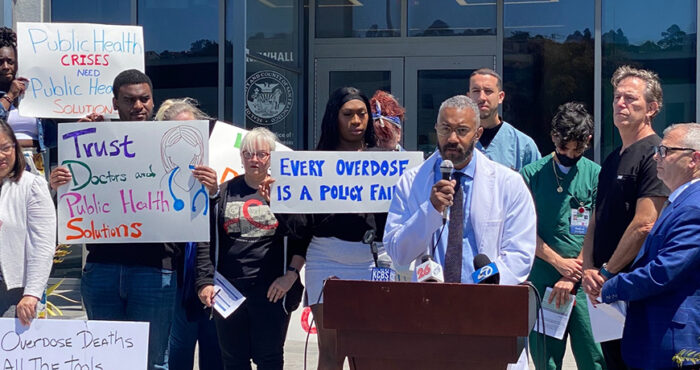Harm reduction: promoting health, upholding dignity, saving lives

When I arrived here in the city two and half years ago to take the helm of SFAF, I only had a limited understanding of harm reduction as part of a larger comprehensive strategy for addressing the overdose crisis in our country. What I have witnessed and learned about the impact of these evidence-based strategies during this timeframe while seeing my team in action is truly profound. Despite the daily political and social pressures around them, they show up day in and day out for our community, and with love and compassion they portray the best of humanity.
At SFAF, we believe in the power of harm reduction to save lives, promote health, and uphold the dignity of every individual. Harm reduction is rooted in compassion and evidence. It’s about practical, life-saving strategies that are designed to minimize the negative consequences of certain behaviors rather than eliminate the behaviors themselves.
Now, I understand that harm reduction can be a difficult concept to embrace, but there is a robust body of evidence that supports harm reduction as an effective and humane strategy for addressing complex public health challenges, particularly those related to substance use.
Harm reduction is not a new or radical concept—it’s a well-established public health strategy that we all encounter in various forms every day.
For example, seat belts in cars are a form of harm reduction. They don’t prevent car accidents from happening, but they significantly reduce the risk of injury or death when an accident does occur. Similarly, condoms and PrEP are other harm reduction strategies–reducing the risk of STIs and HIV without requiring people to abstain from sex.
Even smoking cessation programs often employ harm reduction strategies. Nicotine patches or e-cigarettes provide a less harmful way to consume nicotine, allowing people to reduce their dependence on cigarettes while minimizing the associated health risks.
Similarly, harm reduction related to substance use is not about endorsing or encouraging drug use; rather, it is about meeting people where they are and providing them with the tools and support they need to minimize the risks associated with their behaviors.
The evidence is there to support harm reduction strategies around substance use. Needle exchange programs, access to naloxone, sterile needles, and other safer use supplies, and supervised consumption sites save lives, reduce the spread of infectious diseases, and connect individuals with healthcare services and social support. These programs have been proven to lower rates of HIV and hepatitis C transmission, reduce overdose deaths, and serve as a gateway to comprehensive care and treatment.
I understand that programs like the distribution of safer smoking supplies can be controversial. But, like the distribution of sterile syringes, smoking supplies are evidence-based public health strategies that help prevent the spread of infectious diseases like HIV and hepatitis C, by helping to reduce the transition from smoking to IV drug use (which is much riskier in terms of disease transmission).
A common narrative I hear is that people believe that the solution to San Francisco’s overdose crisis is through increased criminalization and forced recovery, but here is what I know to be true based on the evidence:
Criminalizing people who use drugs has been shown to exacerbate the overdose crisis rather than improve it. Punitive measures drive drug use underground, making it harder for individuals to access life-saving resources like naloxone, syringe exchange and other safer use supplies, and treatment options.
Criminalization also increases stigma around drug use, which can prevent people from seeking counseling, treatment, and support.
It’s also critically important to note that the criminalization of people who use substances is deeply rooted in white supremacy, as it has historically been used as a tool to control and oppress communities of color. From the racially charged “War on Drugs” to discriminatory sentencing laws, drug policies have disproportionately targeted Black, Latine, and Indigenous people. These policies are not just about public safety but about maintaining racial hierarchies by criminalizing behaviors more common in marginalized communities. This approach ignores the social and economic factors that lead to substance use and fuels mass incarceration, further entrenching systemic inequalities.
Moreover, forced treatment and recovery programs, often touted as alternatives to incarceration, fail to address the underlying issues of substance use and can cause further harm. These programs operate under the same punitive logic as criminalization, stripping individuals of autonomy and ignoring the importance of voluntary, person-centered care. Forced treatment is often ineffective, leading to high rates of relapse and recidivism, as it fails to engage individuals in meaningful, long-term recovery. This approach reinforces a cycle of failure, disproportionately impacting people of color who are more likely to be subjected to these coercive measures. Instead of punitive responses, what’s needed are harm reduction strategies and voluntary, supportive services that respect the dignity and autonomy of people who use substances.
Far from enabling drug use, harm reduction strategies are a public health necessity that protect entire communities.
Our team at SFAF are committed to advancing these proven strategies because we know they work and we know we are saving lives. By focusing on evidence-based interventions and compassionate care, we can continue to make San Francisco a leader in public health, where everyone is supported on their journey to better health.
Together, we can advocate for policies that protect and empower our most vulnerable community members, ensuring that no one is left behind.
San Francisco has long been a leader in public health innovation, and it is crucial that despite the realities of increased political and social pressure, that we continue to base our policies on evidence, compassion, and a commitment to the well-being of all our residents. By supporting harm reduction, we are not only addressing the immediate needs of those who use substances, but we are also investing in the long-term health and safety of our entire community.
Our commitment at San Francisco AIDS Foundation is to create a healthier, safer city for everyone, grounded in compassion and evidence, not ideology.
I invite you to explore the extensive research on harm reduction and to engage in an open dialogue about how we can best support our fellow community members.
Together, we can create a San Francisco that values health, dignity, and equity for everyone.










